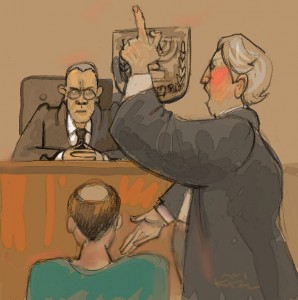Haim Watzman
Your honor, I realize that it is irregular that counsel for a member of the courtroom audience approach the bench. But I hope that you will hold your peace and allow me, before you hand down the sentences of the men and women convicted in the Holyland case, to present my client’s plea.

illustration by Avi Katz
My client—this is he, sitting here in the front row, the one with the funny nose, no, he’s not in a coma, that’s just his way of displaying interest—is a man of modest means, a freelance writer whose words have quickened the hearts of a handful of readers around the globe. He’s a family man, devoted to his community and his country, the salt of the earth, as we like to say. Unlike the movers and shakers who sit in the dock before you, Haim Watzman is barely known to anyone of importance. Like millions of other Israeli citizens, he labors long hours silently, without wealth and fame. And he has come here to ask, Judge Rosen, why he, too, should not be provided with room and board by the state for the next several years.
Has he committed a crime? No, he has committed no crime—because Israeli society has given him no opportunity to do so. Had he been born into wealth, he might have used it to corrupt one of our leaders. Had he been appointed to a position of power, he might have used his influence for personal gain. Never having been invested with the public trust, he was barred from violating it.
I ask you, your honor, is this fair?





